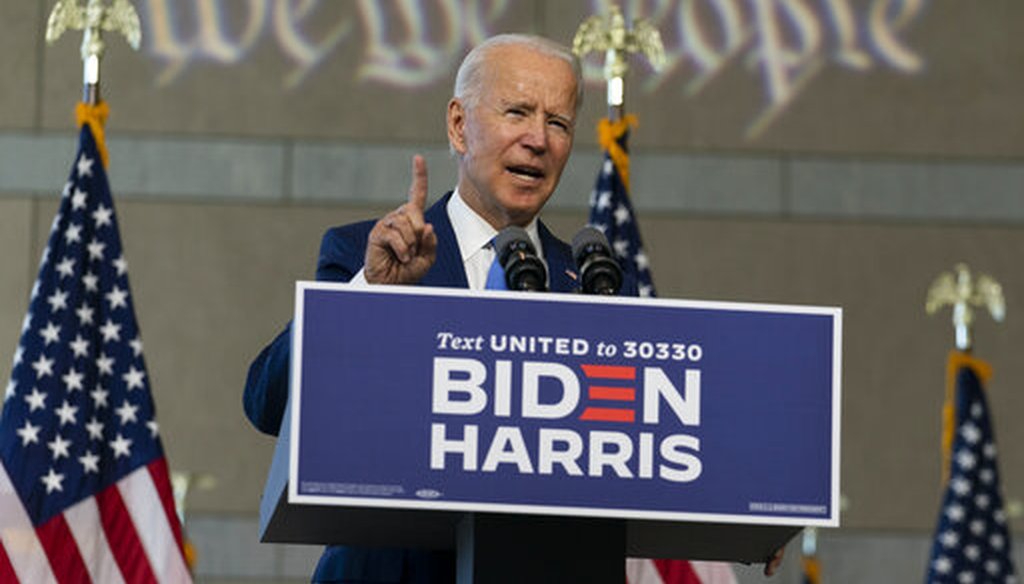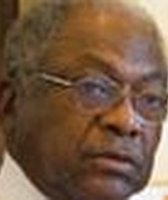Stand up for the facts!
Our only agenda is to publish the truth so you can be an informed participant in democracy.
We need your help.
I would like to contribute

Democratic presidential candidate and former Vice President Joe Biden speaks at the Constitution Center in Philadelphia, Sunday, Sept. 20, 2020, about the Supreme Court. (AP)
If Your Time is short
-
Biden gave a long speech in June 1992 calling for then President George H.W. Bush to not proceed with a Supreme Court nomination should a vacancy occur, although there was none at the time. This speech would later be dubbed “The Biden rule.”
-
In his speech, Biden made a case for both parties, and the White House and Senate, to work together on Supreme Court nominations.
-
Biden didn’t appear to rule out a nomination after Election Day, stating that a “nomination must be put off until after the election campaign is over."
The death of Justice Ruth Bader Ginsburg has prompted a look back at what Democratic presidential nominee Joe Biden said about Supreme Court nominations during election years.
In 1992, Biden led the Senate Judiciary Committee as chairman. He made a long speech calling to delay any hypothetical nominations until after the election.
Senate Majority Leader Mitch McConnell cited what he called the "Biden rule" frequently as he blocked President Barack Obama’s Supreme Court nominee Merrick Garland for most of 2016.
In remarks from Philadelphia’s National Constitution Center two days after Ginsburg’s death, Biden criticized McConnell for planning a vote on Trump’s nominee. Biden also went after McConnell for how miscasting what Biden said about Supreme Court nominations in election years.
"McConnell made up a rule based on the fiction that I somehow believe there should be no nomination to the court in an election year," Biden said in Philadelphia. "That’s ridiculous."
Biden’s 1992 remarks about election year Supreme Court nominations have been overstated. He didn’t say that nominations shouldn’t occur at all during an election year, but he said the process should wait until after Election Day and that the different branches of government should work together.
RELATED: How Republicans could fill Ruth Bader Ginsburg’s seat, explained
What Sen Biden said in 1992 about SCOTUS nominations
Then-Sen.Biden made his floor speech about Supreme Court nominations on June 25, 1992, while President George H.W. Bush was running against Bill Clinton. There are a few key differences about the context of Biden’s 1992 remarks and the situation in 2020:
-
Biden was speaking about a hypothetical situation, since there were no vacancies, although there had been rumors that 83-year-old Harry Blackmun could retire. In 2020, there is an actual vacancy.
-
Election Day in 1992 was more than four months away when Biden made his remarks, whereas this year, some voters have already cast ballots.
-
At the time of Biden’s 1992 speech, Democrats held the majority in the Senate and the Republicans held the White House. Today, the Republicans control both the Senate and the White House.
Against that backdrop, Biden fired a warning shot in a 90-minute floor speech. Biden said that if a vacancy arose, Bush shouldn’t nominate a justice, and if he did, Biden would discourage the Senate from holding confirmation hearings amid campaign season. Biden said that such a nomination process would be more bitter than the one for Clarence Thomas the year before.
"Should a justice resign this summer and the president move to name a successor, actions that will occur just days before the Democratic Presidential Convention and weeks before the Republican Convention meets, a process that is already in doubt in the minds of many will become distrusted by all," Biden said. "Senate consideration of a nominee under these circumstances is not fair to the president, to the nominee, or to the Senate itself.
"Mr. President, where the nation should be treated to a consideration of constitutional philosophy, all it will get in such circumstances is a partisan bickering and political posturing from both parties and from both ends of Pennsylvania Avenue. As a result, it is my view that if a Supreme Court Justice resigns tomorrow, or within the next several weeks, or resigns at the end of the summer, President Bush should consider following the practice of a majority of his predecessors and not — and not — name a nominee until after the November election is completed."
Biden said if Bush were to nominate someone anyway, "the Senate Judiciary Committee should seriously consider not scheduling confirmation hearings on the nomination until after the political campaign season is over."
Biden seemed to leave open the possibility of proceeding with a hypothetical nomination process after Election Day, still leaving a couple months in the year.
"Some will criticize such a decision and say it was nothing more than an attempt to save a seat on the court in the hopes that a Democrat will be permitted to fill it. But that would not be our intention, Mr. President, if that were the course we were to choose in the Senate — to not consider holding hearings until after the election. Instead, it would be our pragmatic conclusion that once the political season is under way, and it is, action on a Supreme Court nomination must be put off until after the election campaign is over."
Biden called for both parties, and the White House and Senate, to work together on Supreme Court nominations starting with the next president’s term.
If Clinton were to win with a divided government in 1992, Biden said he would advise him to "seek the advice of the Republican Senate and compromise.
"Otherwise, this Republican Senate would be totally entitled to say I reject the nominees of a Democratic President who is attempting to remake the Court in a way with which I disagree. ..."
"But I believe that so long as the public continues to split its confidence between the branches, compromise is the responsible course both for the White House and for the Senate. Therefore, I stand by my position, Mr. President. If the president consults and cooperates with the Senate or moderates his selections absent consultation, then his nominees may enjoy my support as did Justices Kennedy and Souter."
What Biden has since said about his 1992 remarks
Biden’s remarks didn’t spark much reaction at the time. No rule was formalized.
"The ‘Biden rule’ was one senator’s opinion," Washington University political scientist Steven S. Smith told PolitiFact. "It was a recommendation made in a floor speech. It was not a policy or rule of the Judiciary Committee or the Senate. Because no vacancy materialized, few other senators had reason to express a view about Biden’s recommendation."
Biden’s 1992 speech drew far more attention decades later, after Justice Scalia’s death in 2016 and in 2018 when Brett Kavanaugh was confirmed to fill the seat of Justice Kennedy, who retired.
Biden has said that his 1992 remarks were misinterpreted and that his speech should be analyzed in full.
In an op-ed in the New York Times in March 2016, Biden said, "My purpose was not to obstruct, but to call for two important goals: restoring a more consultative process between the White House and the Senate in filling Supreme Court vacancies, and encouraging the nomination of a consensus candidate who could lower the partisan temperature in the country."
Over the years, McConnell has referred back to Biden’s remarks, and comments by other Democratic senators, as suggesting that they wouldn’t fill a vacancy at all during an election year if the tables were turned.
Following Ginsburg’s death, Biden said it’s wrong to state that he said in 1992 that there should not be a nomination in an election year at all. Biden said even if Trump puts forward a name now the Senate should wait until after the election.
"If Donald Trump wins the election, then the Senate should move on his selection and weigh the nominee he chooses fairly," Biden said.
Our Sources
PolitiFact, What Mitch McConnell said about Supreme Court confirmations in election years, July 2, 2018
PolitiFact, "In Context: The 'Biden Rule' on Supreme Court nominations in an election yearThe Biden rule," March 17, 2016
PolitiFact, "Seven questions about Obama’s Supreme Court nominee Merrick Garland," March 16, 2016
Mitch McConnell Senate website, "McConnell On Supreme Court Nomination," March 16 2016, accessed March 17, 2016
Mother Jones, "A long list of GOP senators who promised not to confirm a Supreme Court nominee during an election year," Sept. 18, 2020
New York Times, "Ginsburg vacancy is the second closest to a U.S. election ever," Sept. 19, 2020
Tweet from Senate Majority Leader Mitch McConnell, Sept. 18, 2020
Tweet of C-Span video featuring Joe Biden, Sept. 19, 2020
Biden campaign statement on passing of Ruth Bader Ginsburg, Sept. 18, 2020
Wall Street Journal op-ed, "Why the Biden rule doesn’t apply in 2020," Sept. 19, 2020
Rev.com, Joe Biden Philadelphia speech transcript, Sept. 20, 2020
NPR Biden: don’t fill SCOTUS vacancy pre-November, June 25, 1992
USA Today, Biden gives warning on court nomination, June 26, 1992
Washington Post, Joe Biden in 1992: No nominations to the Supreme Court in an election year, Feb. 22, 2016
Sen. Joe Biden, Speech about confirmation process and Congressional record, June 25, 1992
Email interview, Andrew Bates, Biden campaign spokesperson, Sept. 21, 2020
Email interview, Steven S. Smith, political science professor at Washington University in St. Louis, Sept. 21, 2020
Email interview, Mark Tushnet, constitutional law professor at Harvard, Sept. 21, 2020












































